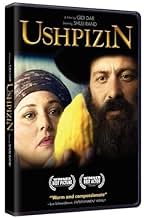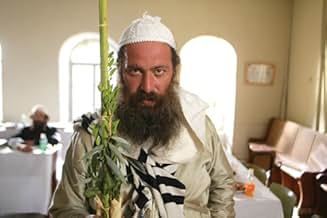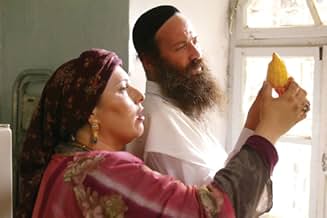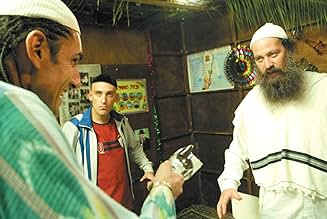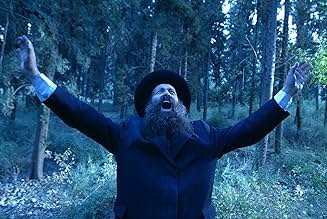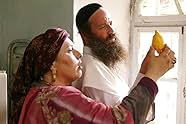IMDb RATING
7.3/10
2.2K
YOUR RATING
An Orthodox Jewish couple's faith is tested after praying to the Lord for a child on the Succoth holiday.An Orthodox Jewish couple's faith is tested after praying to the Lord for a child on the Succoth holiday.An Orthodox Jewish couple's faith is tested after praying to the Lord for a child on the Succoth holiday.
- Awards
- 1 win & 4 nominations
Daniel Dayan
- The Rabbi
- (as Rabbi Daniel Dayan)
Michael Weigel
- Ethrog Assessor
- (as Michael Vaigel)
- Director
- Writer
- All cast & crew
- Production, box office & more at IMDbPro
Storyline
Did you know
- TriviaShuli Rand had two conditions for making this movie, both were met. The first was that his real-life wife, Michal Bat-Sheva Rand, would play his wife in the film. The second is that in Israel the film would not be screened on the Jewish Sabbath.
- Quotes
[from trailer]
Narrator: They worked out of luck, out of hope. And faith was all they had to hang on to. But on this holy week, where guests are considered a blessing, these two unexpected visitors bring with them: a secret from the past. A secret that would test their love and challenge their faith. Now only a miracle will turn their fortune around.
- ConnectionsFeatured in Sharon Amrani: Remember His Name (2010)
Featured review
"Ha Ushpizin" is like a cross between Isaac Bashevis Singer and O. Henry stories brought to life in contemporary Jerusalem.
Set just before and during the fall harvest festival of Succoth, it is a modern retelling of the story from Genesis and its accompanying Midrash (extra-Biblical story) of Abraham encouraging guests (the title in Aramaic) to his house, that has become a mitzvah (obligation) for holidays. It is a thoroughly charming story of faith and love - and how maintaining both is a daily struggle requiring patience and humor and can even replace therapy.
What makes the film so involving emotionally is the superb acting. In Q & A at the Tribeca Film Festival the Orthodox writer/star and secular director explained they came up with the film, which was inspired by an actual incident that is used as a plot point, and worked diligently to get rabbinical approval by meeting certain restrictions, in order to put a human face behind the head coverings and beards of the Ultra Orthodox in Israel to help ease the tensions between their community ("the Hats" as they are called in short hand) and the majority secular citizens of Israel.
Shuli Rand was a leading film and theater actor before he gave up a secular life for a religious one, much as his character has only been religious for a few years after a somewhat shady past that in the film literally comes back to haunt him. His wife and co-star Michal Bat-Sheva Rand had been a theater director in her past and only agreed to act in this film as that was one of the rabbi's requirements for approval; a story about a couple had to be portrayed by an actual married pair. Practically swaddled burkha-like and almost as wide as she is tall, she unpredictably dominates the screen and takes it above any other more anthropological film about traditional families from any part of the world.
The modern sociological examinations are limited to having the only secular characters in the film be somewhat stereotyped; the kindliest one can say about them is that they are like citizens of Chelm or descendants of Vladimir and Estragon when they are comic relief or a menacing Laurel and Hardy.
There is some gentle clear-eyed look at the Ultra Orthodox as not serving in the Army and living only on charity that they mostly collect like Hare Krishnas in the street or from guilt-ridden Modern Orthodox businessmen that is then distributed based on the internal politics of their affiliated yeshiva.
I also have qualms about prayer being used for such personal propitiation as the couple do here, but that aspect is directed so delightfully and heartwarmingly that it's Scrooge-like to complain.
The visuals of the community of Mea Shearim, the Ultra-Orthodox Jerusalem neighborhood where the film is set, with the temporary Succoth (booths for outdoor eating) set up throughout of various materials, are marvelous views that outsiders rarely get to see.
When it is released in Fall 2005 in the U.S. (with special screenings set up for the Hassidic communities that cannot attend secular theaters with mixed audiences) I doubt viewers will get to participate in the kind of lively and colorful audience I did at the Museum of Jewish Heritage which included almost every possible age and affiliation of New York Jews, particularly from Brooklyn, and some non-Jewish out-of-towners in for the Festival.
But all the Orthodox attendees wanted to know was how the secular director could not be inspired to take the pledge, as it were, after making such a film? He pointed out that his sound designer was so inspired - who stood up to much cheering from many in the crowd.
Set just before and during the fall harvest festival of Succoth, it is a modern retelling of the story from Genesis and its accompanying Midrash (extra-Biblical story) of Abraham encouraging guests (the title in Aramaic) to his house, that has become a mitzvah (obligation) for holidays. It is a thoroughly charming story of faith and love - and how maintaining both is a daily struggle requiring patience and humor and can even replace therapy.
What makes the film so involving emotionally is the superb acting. In Q & A at the Tribeca Film Festival the Orthodox writer/star and secular director explained they came up with the film, which was inspired by an actual incident that is used as a plot point, and worked diligently to get rabbinical approval by meeting certain restrictions, in order to put a human face behind the head coverings and beards of the Ultra Orthodox in Israel to help ease the tensions between their community ("the Hats" as they are called in short hand) and the majority secular citizens of Israel.
Shuli Rand was a leading film and theater actor before he gave up a secular life for a religious one, much as his character has only been religious for a few years after a somewhat shady past that in the film literally comes back to haunt him. His wife and co-star Michal Bat-Sheva Rand had been a theater director in her past and only agreed to act in this film as that was one of the rabbi's requirements for approval; a story about a couple had to be portrayed by an actual married pair. Practically swaddled burkha-like and almost as wide as she is tall, she unpredictably dominates the screen and takes it above any other more anthropological film about traditional families from any part of the world.
The modern sociological examinations are limited to having the only secular characters in the film be somewhat stereotyped; the kindliest one can say about them is that they are like citizens of Chelm or descendants of Vladimir and Estragon when they are comic relief or a menacing Laurel and Hardy.
There is some gentle clear-eyed look at the Ultra Orthodox as not serving in the Army and living only on charity that they mostly collect like Hare Krishnas in the street or from guilt-ridden Modern Orthodox businessmen that is then distributed based on the internal politics of their affiliated yeshiva.
I also have qualms about prayer being used for such personal propitiation as the couple do here, but that aspect is directed so delightfully and heartwarmingly that it's Scrooge-like to complain.
The visuals of the community of Mea Shearim, the Ultra-Orthodox Jerusalem neighborhood where the film is set, with the temporary Succoth (booths for outdoor eating) set up throughout of various materials, are marvelous views that outsiders rarely get to see.
When it is released in Fall 2005 in the U.S. (with special screenings set up for the Hassidic communities that cannot attend secular theaters with mixed audiences) I doubt viewers will get to participate in the kind of lively and colorful audience I did at the Museum of Jewish Heritage which included almost every possible age and affiliation of New York Jews, particularly from Brooklyn, and some non-Jewish out-of-towners in for the Festival.
But all the Orthodox attendees wanted to know was how the secular director could not be inspired to take the pledge, as it were, after making such a film? He pointed out that his sound designer was so inspired - who stood up to much cheering from many in the crowd.
Details
- Release date
- Country of origin
- Official site
- Languages
- Also known as
- Holy Guests
- Filming locations
- Production company
- See more company credits at IMDbPro
Box office
- Gross US & Canada
- $1,400,666
- Opening weekend US & Canada
- $64,423
- Oct 23, 2005
- Gross worldwide
- $1,565,016
Contribute to this page
Suggest an edit or add missing content






